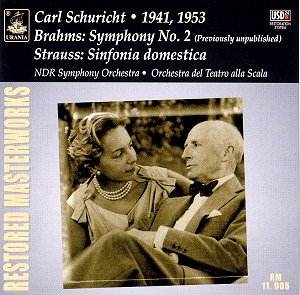Brahms once walked out of a performance of one
of his symphonies conducted by the great Hans Richter because
he found the pulse too rigid. Presumably he would have enjoyed
Carl Schurichtís rhapsodic way with the first movement in particular
(in the others one is conscious of an ebb and flow more than actual
departures from the basic tempo). However, the conductor gets
away with it, as he does in his rather celebrated studio recording
of Bruckner 9, because he always seems to know where the music
is going Ė Iíve heard some strict-tempo performances which have
far less sense of direction Ė and because of the warm-hearted
response he obtains from the orchestra. I donít think Iíve ever
heard a Brahms performance more sung than this one, and
those who feel that Brahms sometimes allows logical and structural
considerations to inhibit his free-flowing musicality (Tchaikovsky
thought this) might change their minds after hearing Schuricht.
Another strength of this conductor is that he is able to keep
rhythms light and textures clear even in slow tempi. The third
movement is definitely on the slow side, but so balletically sprung
is it that I found it quite delightful. Only in the finale did
I feel that the more taut, architectural approach of Sir Adrian
Boult brings greater dividends Ė his finale really crowns his
performance, but I shall return to Schuricht often for his many
insights along the way.
Warmth, tenderness and flexibility are also the
keynotes of his Symphonia Domestica. Maybe, heard in the
flesh, Schuricht would have brought enough clarity to the last
movement to convince me that it is not all a lot of noise about
nothing, but it is too much to expect these 1949 acetates to cope
and I soon found my attention wandering. Not that the sound is
bad for its age Ė a bit shallow and congested, but good enough
to let us enjoy the gentler passages and Schurichtís handling
of them. The orchestra of La Scala copes pretty well with music
which was hardly their daily bread and combine with the conductor
in a touching tribute to the composer who had died just two months
earlier.
The recording of the Brahms is from a tape and
the opening is a little damaged (also, the first note is very
much shortened). Donít let this put you off as it soon settles
down to a sound that is very acceptable for the date and the performance
is definitely worth knowing. The booklet has no information of
any kind about either the music or the conductor. It is a sign
of our international times that a disc made in Italy should call
the Brahms a "Symphony" when they might have been expected to
use either their own language or Brahmsís. I donít know what language
Strauss thought "Symphonia" was, but I donít blame them for "correcting"
it to "Sinfonia".
Christopher Howell
